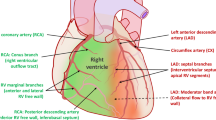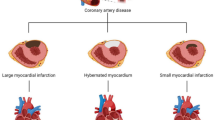Abstract
Aortic regurgitation (AR) is a valve disease that causes severe complications and reduces life expectancy. Surgical correction is required in the late stages of the disease. In less advanced forms, treatment with vasodilators is a consideration. The available evidence suggests that this type of treatment has a favorable effect on the consequences of AR, particularly left ventricular remodeling. However, the impact of vasodilators on clinical endpoints complicating the course of AR remains in doubt. The limited evidence supporting or opposing the utilization of vasodilators in AR hinders drawing firm conclusions and emphasizes the process of individualized interpretation of the clinical presentation of patients with the disease.
Similar content being viewed by others
References and Recommended Reading
Of importance Enriquez-Sarano M, Tajik AJ:Clinical practice. Aortic regurgitation.N Engl J Med 2004,351:1539–1546. A detailed review of the management of patients with AR.
Dujardin KS, Enriquez-Sarano M, Schaff HV, et al.:Mortality and morbidity of aortic regurgitation in clinical practice. A long-term follow-up study.Circulation 1999,99:1851–1857.
Of importance Bonow RO, Carabello BA, Chatterjee K, et al.:ACC/AHA 2006 guidelines for the management of patients with valvular heart disease: A report of the American College of Cardiology/American Heart Association Task Force on Practice Guidelines (Writing Committee to Revise the 1998 Guidelines for the Management of Patients with Valvular Heart Disease): dDeveloped in collaboration with the Society of Cardiovascular Anesthesiologists.Circulation 2006,114:e84-e231. The mos: recent guidelines on the management of patients with valvular heart diseases, particularly AR.
Iung B, Gohlke-Barwolf C, Tornos P, et al.:Recommendations on the management of the asymptomatic patient with valvular heart disease.Eur Heart J 2002,23:1253–1266.
Bonow RO, Lakatos E, Maron BJ, Epstein SE:Serial long-term assessment of the natural history of asymptomatic patients with chronic aortic regurgitation and normal left ventricular systolic function.Circulation 1991,84:1625–1635.
Tribouilloy CM, Enriquez-Sarano M, Fett SL, et al.:Application of the proximal flow convergence method to calculate the effective regurgitant orifice area in aortic regurgitation.J Am Coll Cardiol 1998,32:1032–1039.
Zoghhi WA, Enriquez-Sarano M, Foster E, et al.:Recommendations for evaluation of the severity of native valvular regurgitation with two-dimensional and Doppler echocar-diography.J Am Soc Echocardiogr 2003,16:777–802.
Reimold SC, Orav EJ, Come PC, et al.:Progressive enlargement of the regurgitant orifice in patients with chronic aortic regurgitation.J Am Soc Echocardiogr 1998,11:259–265.
Borow KM, Marcus RH:Aortic regurgitation: the need for an integrated physiologic approach.J Am Coll Cardiol 1991,17:898–900.
Chaliki HP, Mohty D, Avierinos J-F, et al.:Outcomes after aortic valve replacement in patients with severe aortic regurgitation and markedly reduced left ventricular function.Circulation 2002,106:2687–2693.
Wisenbaugh T, Spann JF, Carahello BA:Differences in myocardial performance and load between patients with similar amounts of chronic aortic versus chronic mitral regurgitation.J Am Coll Cardiol 1984,3:916–23.
Ross J Jr:Afterload mismatch in aortic and mitral valve disease: implications for surgical therapy.J Am Coll Cardiol 1985,5:811–826.
Bonow RO, Dodd JT, Maron BJ, et al.:Long-term serial changes in left ventricular function and reversal of ventricular dilatation after valve replacement for chronic aortic regurgitation.Circulation 1988,78:1108–1120.
Bonow RO, Rosing DR, Maron BJ:Reversal of left ventricular dysfunction after aortic valve replacement for chronic aortic regurgitation: influence of duration of preoperative left ventricular dysfunction.Circulation 1984,70:570–579.
Tarasoutchi F, Grinberg M, Spina GS, et al.:Ten-year clinical laboratory follow-up after application of a symptom-based therapeutic strategy to patients with severe chronic aortic regurgitation of predominant rheumatic etiology.J Am Coll Cardiol 2003,41:1316–1324.
Roman MJ, Klein L, Devereux RB, et al.:Reversal of left ventricular dilatation, hypertrophy, and dysfunction by valve replacement in aortic regurgitation.Am Heart J 1989,118:553–563.
Bolen JL, Alderman EL:Hemodynamic consequences of afterload reduction in patients with chronic aortic regurgitation.Circulation 1976,53:879–883.
Miller RR, Vismara LA, DeMaria AN:Afterload reduction therapy with nitroprusside in severe aortic regurgitation: improved cardiac performance and reduced regurgitant volume.Am J Cardiol 1976,38:564–567.
Sasayama S, Ohyagi A, Lee JD:Effect of the vasodilator therapy in regurgitant valvular disease.Jpn Circ J 1982,46:433–441.
Greenberg BH, DeMots H, Murphy E, Rahimtoola SH:Mechanism for improved cardiac performance with arteriolar dilators in aortic insufficiency.Circulation 1981,63:263–268.
Greenberg BH, DeMots H, Murphy E, Rahimtoola S:Beneficial effects of hydralazine on rest and exercise hemodynamics in patients with chronic severe aortic insufficiency.Carculation 1980,62:49–55.
Fioretti P, Benussi B, Scardi S:Afterload reduction with nifedipine in aortic insufficiency.Am J Cardiol 1982,49:1728–1732.
Greenberg B, Massie B, Bristow JD, et al.:Long-term vasodilator therapy of chronic aortic insufficiency. A randomized double-blinded, placebo-controlled clinical trial.Circulation 1988,78:92–103.
Lin M, Chiang H-T, Lin S-L, et al.:Vasodilator therapy in chronic asymptomatic aortic regurgitation: enalapril versus hydralazine therapy.J Am Coll Cardiol 1994,24:1046–1053.
Schon HR, Dorn R, Barthel P, Schomig A:Effects of 12 months quinapril therapy in asymptomatic patients with chronic aortic regurgitation.J Heart Valve Dis 1994,3:500–509.
Mori Y, Nakazawa M, Tomimatsu H, Momma K:Longterm effect of angiotensin-converting enzyme inhibitor in volume overloaded heart during growth: a controlled pilot study.J Am Coll Cardiol 2000,36:270–275.
Banaszewski M, Rydlewska-Sadowska W, Rubkiewicz S:Captopril or nifedipine? Comparison of rest and exercise acute effects and long-term therapy in chronic isolated asymptomatic moderate to severe aortic regurgitation.J Heart Valve Dis 1998,7:488–499.
Scognamiglio R, Rahimtoola SH, Fasoli G, et al.:Nifedipine in asymptomatic patients with severe aortic regurgitation and normal left ventricular function.N Engl J Med 1994,331:689–694.
Of importance Evangelista A, Tornos P, Sambola A, et al.:Long-term vasodilator therapy in patients with severe aortic regurgitation.N Engl J Med 2005,353:1342–1349. A small but long-term randomized study of vasodilators in patients with AR.
Of importance Scognamiglio R, Negut C, Palisi M, et al.:Long-term survival and functional results after aortic valve replacement in asymptomatic patients with chronic severe aortic regurgitation and left ventricular dysfunction.J Am Coll Cardiol 2005,45:1025–1030. Long-term survival after surgery in patients with AR comparing patients preoperatively treated with or without nifedipine.
Hockings BEF, Cope GD, Clarke GM, Taylor RR:Comparison of vasodilator drug prazosin with digoxin in aortic regurgitation.Br Heart J 1980,43:550–555.
Jebavy P, Koudelkova E, Hanzlova M:Unloading effects of prazosin in patients with chronic aortic regurgitation.Am Heart J 1983,105:567–574.
Reske SN, Heck I, Kropp J:Captopril mediated decrease of aortic regurgitation.Br Heart J 1985,54:415–419.
Klepzig H Jr, Mildenberger D, Baum R:Therapeutic effect of captopril in chronic aortic regurgitation.Zeitschrift fur Kardiologie 1986,75:283–290.
Rothlisberger C, Sareli P, Wisenbaugh T:Comparison of single-dose nifedipine and captopril for chronic severe aortic regurgitation.Am J Cardiol 1993,72:799–804.
Shen WF, Roubin GS, Hirasawa K:Noninvasive assessment of acute effects of nifedipine on rest and exercise hemodynamics and cardiac function in patients with aortic regurgitation.J Am Coll Cardiol 1984,4:902–907.
Castini D, Gentile F, Siffredi M, et al.:Does aortic regurgitation affect transmitral flow? An echo-Doppler study.Acta Cardiologica 1993,48:345–353.
Søndergaard L, Aldershvile J, Hildebrandt P, et al.:Vasodilatation with felodipine in chronic asymptomatic aortic regurgitation.Am Heart J 2000,139:667–674.
Kleaveland JP, Reichek N, McCarthy DM:Effects of sixmonth afterload reduction therapy with hydralazine in chronic aortic regurgitation.Am J Cardiol 1986,57:1109–1116.
Wisenbaugh T, Sinovich V, Dullabh A, Sareli P:Six month pilot study of captopril for mildly symptomatic, severe isolated mitral and isolated aortic regurgitation.J Heart Valve Dis 1994,3:197–204.
Scognamiglio R, Fasoli G, Ponchia A, Dalla-Volta S:Long-term nifedipine unloading therapy in asymptomatic patients with chronic severe aortic regurgitation.J Am Coll Cardiol 1990,16:424–429.
Author information
Authors and Affiliations
Corresponding author
Rights and permissions
About this article
Cite this article
Inamo, J., Enriquez-Sarano, M. Are vasodilators still indicated in the treatment of severe aortic regurgitation?. Curr Cardiol Rep 9, 87–92 (2007). https://doi.org/10.1007/BF02938333
Issue Date:
DOI: https://doi.org/10.1007/BF02938333




